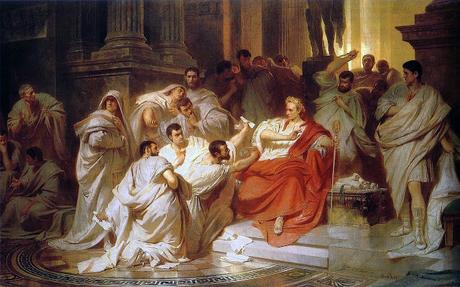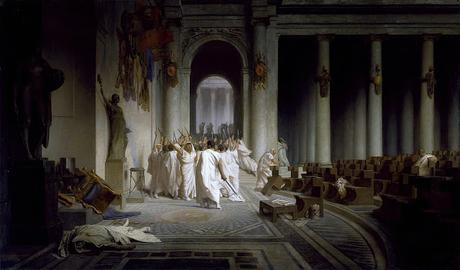Happy Winter Solstice! Enjoy your shortest day and longest night and then we are on the road back to sunshine and less thermal underwear. Let's crack on with today's shortest post...

The Ides of March (1883) Edward Poynter
Just as most of my 18th century knowledge came from Carry On Don't Lose Your Head, all of my Julius Caesar knowledge comes from Carry on Cleo, so I think we can agree I am an expert. Okay, so here we have a nice Roman couple out for a stroll on the 15th March 44BC (your actual Ides), and there is a comet in the sky (I think that's meant to be Caesar's Comet, which was actually seen in July, I think you'll find, but we'll draw a veil). If I remember rightly, comets are signs of what God thinks of things and the comet of 44BC was seen as God giving side-eye at the (spoiler alert) big old stabbing of Julius Caesar in March, but let's not let that get in the way of an atmospheric painting. So, what happened on the Ides of March?

The Death of Caesar (1818) Heinrich Fuger
Julius Caesar is probably one of the best known of the Roman Emperors and he is mostly thought of as productive and positive, if always thwarted by those pesky Gauls (I read a lot of Astrix too), unlike Nero and Caligula who are seen as entirely awful. However, his assassination at the hands of the Senate seems enormously theatrical (and indeed Shakespeare made it into a play, from which we get a lot of our impressions of him) (after Carry on Cleo, obviously). It is from Shakespeare we get the phrase 'Beware the Ides of March', which is said to Caesar as he returns after defeating his rival Pompey. The inference is that Caesar, at that point, began to believe his own hype and was about to make the mistakes that would hack everyone off and lead to a very stabby March indeed.

The Death of Julius Caesar (1888) William Holmes Sullivan
I think the problem was that three times (strange how it is always three times someone does something before it becomes a problem - three is a magic number indeed) Caesar implied he was too cool for school - he refused to rise to meet the Senate (rude), he made a joke that he was not 'Rex' be was 'Caesar' after being called rex by the crowd. The implication was he was saying Rex wasn't his name, but he didn't mind being called King, which was a bit of a no-no. He also refused to wear a diadem that was presented to him, ostentatiously offering it to Jupiter as a sacrifice as 'Jupiter was the only king'. This was seen by many as a sneaky way of testing public opinion to see if the crowd would accept him as king. Basically, Caesar pushed his luck at a power grab and made everyone feel extremely murder-y. That's the problem when your boss is an absolute womble, as the employee, you can't sack him or even get rid of him because it would be likely he's try and get back in power. The Senate decided there was only one way to permanently get rid of Julius Caesar and that involved daggers.

The Murder of Caesar (1865) Karl von Piloty
Various seers foresaw the assassination of Caesar, hence in Shakespeare, one warns him about the Ides of March. Even Calpurnia, Mrs Caesar, had a nightmare where she saw her husband murdered. Caesar thought it best to have a duvet day and stay home but one of the Senate arrived and basically said 'Oh, you are bossed about by your wife then?' and so Caesar put on his toga and went off to the Senate. Apparently, he made the mistake of calling out to the Seer, as he passed her on the road, 'The Ides of March have come and look! I'm absolutely fine!'
For goodness sake...

The Death of Caesar (1859-67) Jean-Léon Gérôme
He turned up to the Senate and that was that. Much stabbing later, there was one Caesar less in the world. Whether or not he shouted 'Infamy, infamy, they've all got it in for me!' is lost to history, but I believe so. So, what does Poynter's painting of the Ides of March show us?

It is a painting of shadows and portent, of things hidden and sudden revelation. In the centre, their backs to us, are Caesar and Calpurnia. She is looking up at her husband and seems to have her arm on his, stopping him. She is telling him that today is the day, the Ides that he has been warned about and she has a very bad feeling indeed.

I am interested in the bust, so sharply up-lit. I wondered if it was Jupiter, because of the hints that Caesar had played around with his own importance in comparison with the God's, but it is not beardy enough. Is it Caesar? Are we up-lighting our own busts now? Is that a thing? Anyway, if you are more educated that what I am in the classics, let me know who that bloke is please.

This is the portion of the painting that I love the most. You don't have to be a fortune teller to look out at that doom-laden sky and say 'I'll just stay in today, because nothing good is happening under that...' The dark shapes, the lurking black figure, the sudden bolt of bright light across the sky? It is all very portentous indeed and everyone need to stay in their pajamas and try again tomorrow when it wasn't the sodding Ides of March anymore. Really, I'm not saying that Caesar deserved to get stabbed to death, but take a day off! Also, don't push your luck with the Senate. And don't be rude to tribunes. Honestly, if every manager I've ever worked under could be given a copy of Julius Caesar and the word 'tribune' be replaced by 'Admin Assistant', then those of us who are support staff might start getting the respect we deserve.
I'll see you tomorrow...

